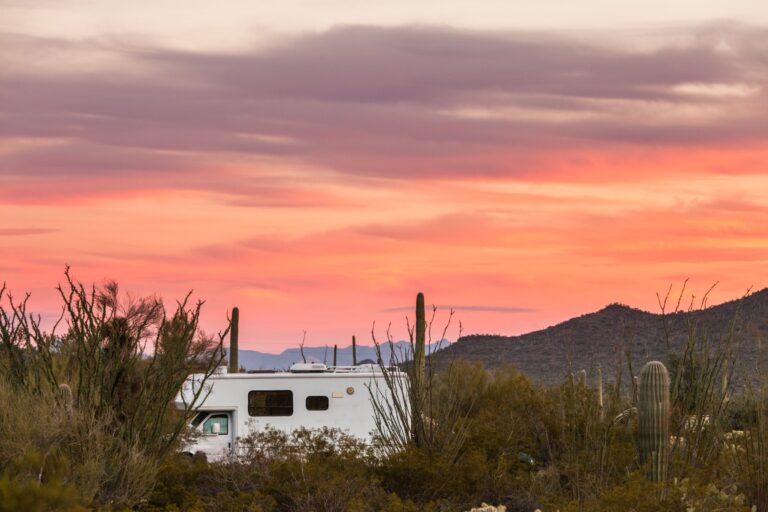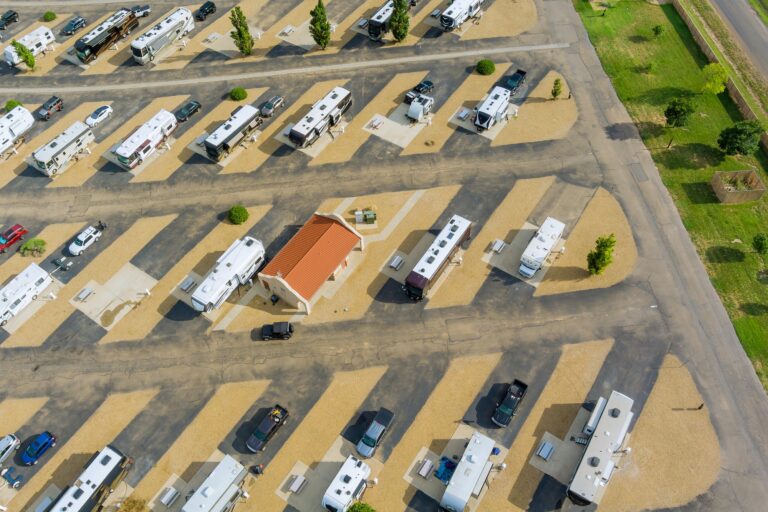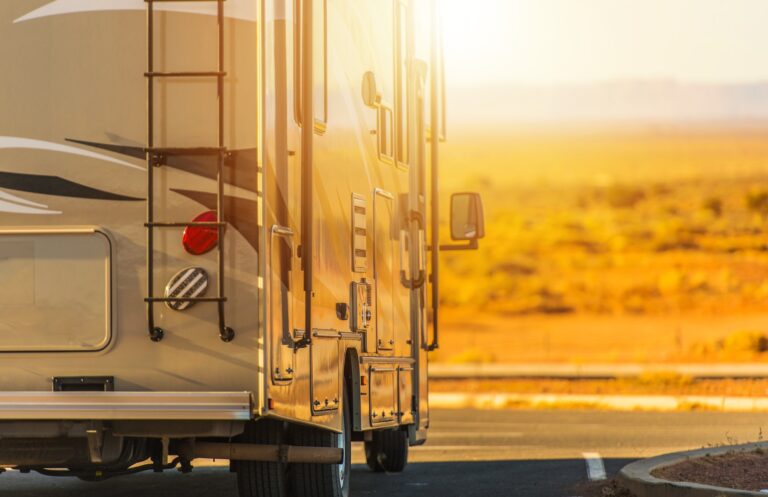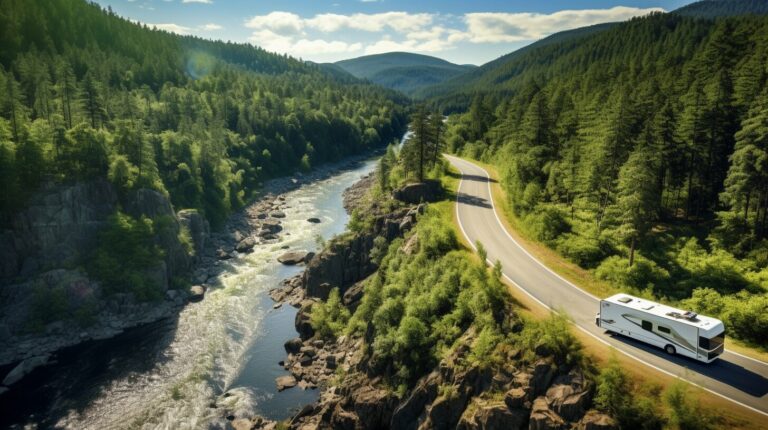Welcome to the world of RV living! If you’re contemplating making the switch to a full-time RV lifestyle, or if you’re a seasoned RVer looking for some fresh tips and tricks, you’ve come to the right place.
RV living offers a unique opportunity to travel and explore the world while enjoying all the comforts of home. It’s a lifestyle that allows you to embrace adventure, connect with nature, and meet new people along the way.
In this article, we’ll cover everything you need to know about living in an RV, from choosing the right rig to staying safe on the road. We’ll discuss essential gear, ways to maximize space, and tips for cooking, cleaning, and maintaining your home on wheels.
So buckle up and get ready for an exciting journey. Whether you’re new to RV living or a seasoned pro, there’s always something new to learn. Let’s dive in and explore the world of RV living together.
Section 2: Choosing the Right RV for Your Lifestyle
Choosing the right RV is crucial for a successful RV living experience. With so many options available, it can be overwhelming to decide which one is best for you. Below are some factors to consider to help you choose the right RV that fits your lifestyle.
Size and Layout
The size and layout of the RV is an important consideration. If you plan on traveling solo or with a partner, a smaller RV with a basic layout might work for you. However, if you have a family or plan on traveling with friends, you might need a larger RV with multiple bedrooms and a spacious layout to accommodate everyone.
Type of RV
There are several types of RVs available, each with its own pros and cons. Class A motorhomes are the largest and most luxurious, while Class B motorhomes are smaller and more agile. Travel trailers and fifth wheels are towable RVs and offer more flexibility in terms of vehicle use. Truck campers are lightweight and can be carried on a pickup truck. Consider which type of RV suits your needs and preferences.
Amenities
RVs come with various amenities, such as kitchen appliances, bathrooms, entertainment systems, and outdoor features like awnings and grills. Decide which amenities are important to you and go for an RV that offers them. Keep in mind that more amenities may come at a higher cost.
Cargo Capacity
Cargo capacity is the amount of weight that an RV can safely carry. Consider the amount of luggage, equipment, and supplies you plan on bringing and make sure the RV you choose has enough cargo capacity to accommodate them.
Cost
The cost of an RV can vary widely depending on its type, size, and amenities. Determine your budget and stick to it while looking for an RV. Don’t forget to factor in other expenses such as insurance, maintenance, and fuel costs.
Essential Gear for RV Living
Living in an RV requires a bit of preparation and the right gear can make all the difference. Here are some items that every RVer should consider having on hand:
| Item | Description |
|---|---|
| Leveling blocks | These blocks help to level out your RV on an uneven surface, ensuring a more comfortable stay. |
| Sewer hose and connectors | These are essential for dumping waste from your RV. |
| Water hoses and filters | Connecting to potable water sources requires hoses and filters to ensure clean drinking water. |
| RV surge protector | Protect your RV’s electrical system from surges and spikes with a surge protector. |
| Tire pressure gauge | Keep your RV’s tires properly inflated with a tire pressure gauge. |
| Emergency kit | An emergency kit should include fire extinguishers, first aid supplies, and tools for basic repairs. |
These are just a few of the essential items RVers should have on hand. Of course, depending on your specific needs and lifestyle, there may be other gear that you find important as well. Don’t forget to consider the weather conditions and activities you plan to participate in when packing for your trip.
Maximizing Space in Your RV
Living in an RV means that you have to make the most of your limited space. Fortunately, there are many ways to optimize your living quarters, providing a comfortable, organized, and efficient environment that feels like home. Here are some tips and tricks for maximizing space in your RV:
Use Multi-Use Items
When purchasing items for your RV, consider investing in multi-use items to save space. For example, collapsible kitchenware, such as bowls, colanders, and measuring cups can decrease the space your dishes and cooking tools take up. Other items, such as a sofa bed or a murphy bed can double as a seating area during the day and a comfortable sleeping space at night.
Install Vertical Storage Solutions
One of the most effective ways to maximize space in your RV is to install vertical storage solutions. This frees up valuable floor space that can be used for other purposes. Consider installing hanging baskets, shelves, and organizers that can be mounted on walls or hung from the ceiling. This will allow you to store more items without cluttering your living area.
Use Under-Bed Storage
The space under your bed is an often overlooked storage area that can be used to store a variety of items. Invest in storage containers that can slide underneath your bed, or consider installing drawers or shelves that can be used to store clothing, linens, or other items.
Invest in a Shower Caddy
Keep your bathroom organized and clutter-free by investing in a shower caddy that can be hung from the showerhead or shower curtain rod. This allows you to store all of your toiletries in one place, freeing up valuable counter space.
Get Creative with Storage Spaces
Think outside the box when it comes to storage space. For example, the space behind your stove can be used to store cooking utensils, pots, and pans. The area above your cabinets can be used to store items that you don’t use on a regular basis, such as holiday decorations or extra bedding. Be creative and make use of any unused spaces in your RV.
By following these tips and tricks, you can make the most of your limited living space and enjoy a comfortable home on the road. Remember, RV living is all about simplicity and embracing the adventure!
Planning Your RV Adventures
One of the greatest joys of RV living is the freedom to travel to new and exciting destinations on a whim. However, a bit of planning can go a long way in making your trips more enjoyable and stress-free.
Choose Your Destinations Carefully
When planning your RV adventures, consider your interests and travel style. Do you prefer the great outdoors or city life? Are you looking for relaxation or adventure? Once you have a clear idea of what you want, start researching locations that match your criteria.
Make sure to also consider any logistical factors, such as the time of year, weather conditions, and road closures. You don’t want to end up in a location that is inaccessible or unpleasant due to unforeseen circumstances.
Create a Budget
RV living can be a cost-effective way to travel, but it’s important to have a budget in place to avoid overspending. Consider expenses such as gas, campsite fees, food, and activities.
Don’t forget to also factor in any maintenance or repair costs for your RV. It’s always a good idea to have some extra money set aside for unexpected expenses.
Map Out Your Route
Once you have your destinations and budget in place, it’s time to map out your route. Consider factors such as distance, driving time, and any notable landmarks or attractions along the way.
Technology can be a helpful tool for route planning, but it’s important to also have a backup plan in case of technological difficulties or roadblocks.
Finding RV-Friendly Campsites
Not all campsites are created equal when it comes to accommodating RVs. When researching campsites, look for those that offer amenities such as electrical and water hookups, dump stations, and RV-specific parking spots.
It’s also a good idea to read reviews from other RVers to get a sense of the campsite’s overall quality and ambiance.
Stay Flexible
While planning ahead is important, it’s also important to stay flexible and open to new opportunities and experiences. You never know what hidden gem or unexpected adventure may be waiting for you on the road.
By following these tips and planning ahead, you can make the most of your RV adventures and create unforgettable memories that will last a lifetime.
Staying Safe on the Road
While RV living offers many freedoms, it’s important to prioritize safety on the road. Here are some tips to keep in mind:
- Maintain your RV: Regular maintenance is key to keeping your RV running smoothly and safely. Make sure to keep up with routine inspections, oil changes, and repairs.
- Check your tires: Before each trip, inspect your tires for signs of wear and tear and ensure they are properly inflated. This can help prevent blowouts and other dangerous incidents.
- Be mindful of weight distribution: Overloading your RV can create unsafe driving conditions. Make sure to distribute weight evenly and avoid packing too much into any one area.
- Be aware of your surroundings: While driving, stay alert and aware of your surroundings. This includes keeping an eye out for other vehicles, pedestrians, and wildlife.
- Plan your route: Before setting out, plan your route carefully and be aware of any potential hazards, such as narrow or winding roads.
- Have an emergency kit: In the event of a breakdown or other emergency, it’s important to have supplies on hand. Pack an emergency kit with items like a first aid kit, flashlight, and extra water and food.
By following these tips and always prioritizing safety, you can enjoy the freedom of RV living with peace of mind.
Maintaining Your RV
Keeping your RV in good condition is essential for safe and enjoyable travel. Regular maintenance, cleaning, and repairs will help to prevent breakdowns and ensure that your RV runs smoothly for years to come.
| Routine Maintenance | Cleaning | Repairs |
|---|---|---|
| Check oil and fluid levels regularly | Sweep and vacuum floors regularly | Identify and fix leaks |
| Inspect tires for wear and tear | Wipe down counters and surfaces | Replace worn or damaged parts |
| Test battery and electrical systems | Clean windows and mirrors | Address engine issues promptly |
When it comes to repairs, it’s important to address issues as soon as possible to prevent them from becoming more serious and costly. There are many resources available for DIY repairs, but it’s also important to know when to call in a professional.
Finding a reliable service center can be a challenge while on the road, so it’s a good idea to research service centers in advance and keep their contact information on hand in case of emergency.
RV Maintenance Checklist
- Check oil and fluid levels
- Inspect tires for wear and tear
- Test battery and electrical systems
- Check brakes and brake pads
- Inspect roof for damage or leaks
By following a regular maintenance schedule and addressing issues promptly, you can keep your RV in top condition and enjoy worry-free travel.
Working While RVing
One of the great things about RV living is the flexibility it offers for working remotely or finding employment on the road. Here are some tips and ideas for making money while living the RV lifestyle:
Remote Work
If you have a job that allows you to work remotely, you can take your work on the road with you. This could include jobs like writing, graphic design, or virtual assistant work. Make sure you have a reliable internet connection and set up a comfortable workspace in your RV.
You can also find remote work opportunities through freelancing platforms like Upwork or Fiverr. Be sure to set up your profile and portfolio so potential clients can see your skills and experience.
Campground Jobs
Many RV parks and campgrounds offer jobs for RVers, including maintenance, office work, and campground hosting. These jobs often provide free or discounted campsite stays in exchange for a certain number of hours worked per week.
You can find campground job listings on websites like Workamper News or CoolWorks. Be sure to apply well in advance, as these jobs can fill up quickly.
Seasonal Work
Another option for RVers is seasonal work, such as working at a national park or tourist attraction during the busy season. These jobs often provide housing or RV sites and can be a fun way to explore a new area while making money.
You can find seasonal job opportunities on websites like USAJOBS and CoolWorks.
Sell Your Skills
Do you have a skill that you can monetize on the road? This could include things like photography, woodworking, or tutoring. Set up a website or social media account to showcase your work and offer your services to others.
You can also sell items you make on websites like Etsy or Amazon Handmade.
Conclusion
There are many ways to make money while living the RV lifestyle. Whether you work remotely, find a campground job, or sell your skills, there is an option that can work for you. With a little creativity and hard work, you can enjoy the freedom and adventure of RV living while still earning a living.
Cooking and Eating in Your RV
One of the joys of RV living is the ability to cook your own meals and enjoy them in the comfort of your own space. However, cooking and eating in an RV can present unique challenges. Here are some tips and tricks to help you make the most of your RV kitchen:
- Plan your meals ahead of time: This will help you make sure you have all the ingredients you need and minimize waste. It can also help you make the most of your limited storage space.
- Invest in multi-use gadgets: Look for tools that can serve multiple purposes to save space in your kitchen. For example, a rice cooker can also be used to steam vegetables.
- Use propane instead of electricity: Cooking with propane can be more efficient than using electricity, especially if you have a smaller RV.
- Make the most of your outdoor space: Consider setting up a portable grill or campfire for outdoor cooking. It can be a fun way to enjoy the outdoors and create delicious meals.
- Keep it simple: Don’t feel pressured to create elaborate meals every day. Simple meals like sandwiches, salads, and pasta dishes can be just as satisfying and require less preparation time.
“Cooking and eating in an RV can be a challenge, but it’s also an opportunity to get creative and make the most of your resources.”
Connecting with the RV Community
Living life on the road can be an amazing adventure, but it can also be a bit isolating at times. That’s why it’s important to connect with others who share your passion for RV living. Here are a few ways to do so:
Join Clubs or Online Groups
There are plenty of clubs and online groups out there for RV enthusiasts. Joining one is a great way to meet like-minded individuals, ask questions, and share tips and advice. Some popular options include the Good Sam Club, Escapees RV Club, and RVillage.
Attend Rallies or Events
Attending rallies and events is another great way to meet other RVers. These gatherings offer the opportunity to connect with others who share your interests, attend seminars and workshops, and participate in fun activities. Check out the schedule for upcoming events and rallies hosted by your favorite RV clubs.
Volunteer
Volunteering is a wonderful way to meet new people and give back to the community at the same time. Many RVers choose to volunteer with organizations like Habitat for Humanity or workamping at state or national parks. Not only will you meet fellow RVers, but you’ll also have the satisfaction of knowing you’re making a difference.
Conclusion
Connecting with other RVers is essential for making the most of your time on the road. Whether you join a club, attend an event, or volunteer your time, you’re sure to make new friends and create memories that will last a lifetime.
FAQ About RV Living
RV living can be an exciting, adventurous, and fulfilling lifestyle. However, it can also come with its fair share of questions and uncertainties. Here are some of the most commonly asked questions about RV living:
How much does it cost to live in an RV full-time?
The cost of full-time RV living can vary widely based on factors such as the type of RV, travel frequency, and personal expenses. However, many full-time RVers report spending between $1,500 and $3,000 per month on travel and living expenses. It’s important to budget carefully and plan ahead to ensure financial stability while on the road.
What kind of maintenance is required for an RV?
Regular maintenance is crucial for keeping an RV in good condition. This can include tasks such as checking fluid levels, inspecting tires, and testing the electrical system. It’s important to follow manufacturer recommendations and seek professional help for any repairs or maintenance beyond your own capabilities.
How do I find RV-friendly campsites?
There are many resources available for finding RV-friendly campsites, including apps such as Campendium and websites like RV Park Reviews. It’s also important to research the specific amenities and features offered by each campground to determine which will best fit your needs and preferences.
Can I work remotely while living in an RV?
Yes, many RVers work remotely while on the road. This can include jobs such as freelance writing, web development, or consulting. It’s important to ensure you have a reliable internet connection and to create a comfortable and productive workspace within your RV.
What do I do if my RV breaks down on the road?
It’s important to have a plan in place for emergency situations while on the road. This can include carrying a spare tire and necessary tools, having a roadside assistance membership, and being knowledgeable about basic RV repairs. In the event of a major breakdown, it may be necessary to seek professional help at a nearby service center.
How do I stay connected with family and friends while on the road?
Staying connected is important for many RVers, and there are many options available for staying in touch with loved ones while on the road. This can include using video chat apps like Skype or FaceTime, maintaining a blog or social media presence, or sending regular updates and postcards.
What should I pack for a long RV trip?
Packing for an RV trip can be overwhelming, but it’s important to remember to bring the essentials such as comfortable clothing, toiletries, and necessary medications. It’s also important to pack basic tools and equipment for minor RV repairs, as well as outdoor gear for camping and exploring.
Is RV living right for me?
This is a personal decision that varies for each individual or family. Consider factors such as your desired lifestyle, budget, and willingness to adapt to a mobile living space. It can be helpful to talk to other RVers and do research to determine if the RV lifestyle is a good match for your needs and goals.






